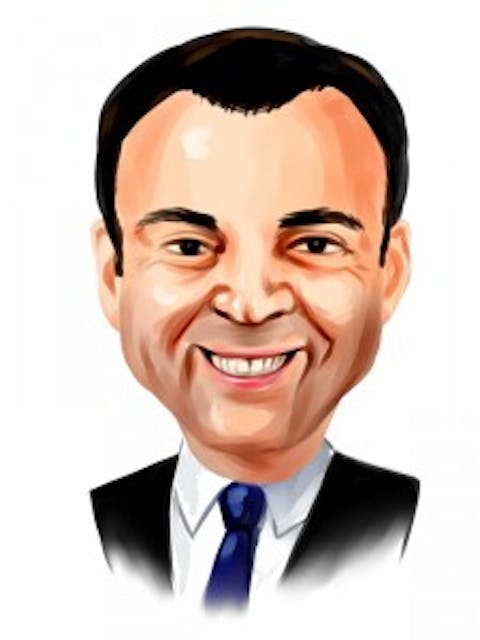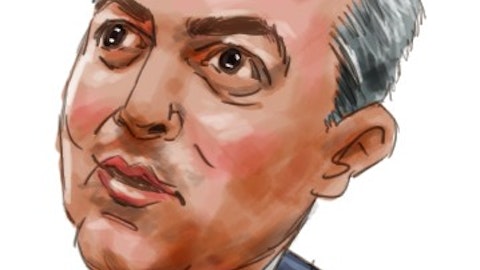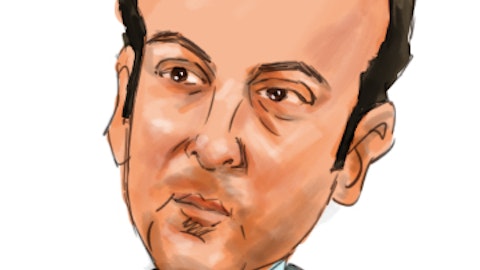
Elliott Management Corp., the hedge fund that backed filmmaker Relativity Media LLC, said the executive overseeing the entertainment investment is leaving as the company reduces its focus on movies. Michael Joe, former president of Relativity, will leave in early 2012 for a new opportunity, New York-based Elliott Management said today in an e-mailed statement. He joined in May to oversee the company’s investments in Relativity and a Universal Pictures film slate. “My passion is to be an active participant within the media and entertainment industry,” Joe, a former Universal Pictures executive, said in the statement.
Lampert Group Cuts Autozone Stake By 42% Amid Redemptions, Reorganizations (Bloomberg)
A group of hedge funds led by Edward Lampert’s ESL Partners LP cut their stake in AutoZone Inc. (AZO) by 42 percent amid redemptions and fund reorganizations, according to a regulatory filing. The group held 4.95 million shares of AutoZone, or 12.6 percent of the outstanding stock, according to a filing dated Dec. 30. That’s down from 8.54 million shares, or 21.7 percent, in the previous filing a day earlier and 14.8 million, or 33.8 percent, in December 2010. The funds sold the shares to meet investor redemptions and “in connection with the termination and winding up of Acres,” one of the funds, according to the filing. ESL also distributed 5.56 million shares of AutoNation Inc. (AN) to meet redemptions by investors in its hedge funds, according to a separate filing with the SEC. That helped cut ESL’s stake in AutoNation to 52.5 percent from 56.4 percent of shares outstanding.
Investors Sent New Money To Hedge Funds In November (Reuters)
Global hedge funds pulled in new money in November, ending months of heavy outflows when investors punished managers for a string of poor returns, new data released on Tuesday showed. Investors put $3.6 billion (2.3 billion pounds) into hedge funds two months ago after having pulled out $9 billion in October and having removed $2.6 billion in September, research firms BarclayHedge and TrimTabs reported on Tuesday. “After months of outflows across nearly every hedge fund category, November saw outflows in only two investment styles,” said Sol Waksman, founder and President of BarclayHedge.
Lightsquared Names New CFO (Reuters)
Billionaire hedge fund manager Philip Falcone‘s LightSquared Inc on Tuesday named telecommunications veteran Marc Montagner as chief financial officer, replacing Michael Montemarano. LightSquared is trying to position itself as a low-cost alternative to the big wireless operators like Verizon Communications Inc. (VZ) and AT&T (T). Montagner, who has nearly 25 years of experience, had worked with France Telecom (FTE), Morgan Stanley (MS), Sprint Nextel (S) and Bank of America Securities (BAC).
Torre, Caruso Join To Bid For Dodgers (Thomson Reuters)
Baseball veteran Joe Torre is partnering with Los Angeles developer Rick Caruso to bid for the bankrupt Los Angeles Dodgers. The two join a long list of prospective bidders lining up for the storied baseball franchise. The Dodgers filed for bankruptcy in June after the Major League Baseball commissioner, Bud Selig, rejected a proposed renewal of the team’s broadcast rights with News Corp’s Fox Sports. The prospective bidders include a who’s who list of sports and financial heavyweights, including basketball legend Magic Johnson, hedge fund titan Steven Cohen, media mogul Mark Cuban, financier Ron Burkle, sports agent and Los Angeles businessman Dennis Gilbert, and former Dodgers star Steve Garvey.
Kodak Preparing For Chapter 11 Filing (WSJ)
Eastman Kodak Co. is preparing for a Chapter 11 bankruptcy-protection filing in the coming weeks should efforts to sell a trove of digital patents fall through, people familiar with the matter said. The struggling photography icon, which employs about 19,000 people, is in discussions with potential lenders for around $1 billion in so-called debtor-in possession financing that would keep it afloat during bankruptcy proceedings, the people said. A filing could occur as soon as this month or early February, one of the people said. Kodak has also held discussions with bondholders about a bankruptcy financing package, the people said. Another hedge fund that doesn’t hold Kodak debt, Cerberus Capital Management LP, has also held talks with Kodak on behalf of a group willing to provide the financing, the people said.
Hedge Funds End 2011 On A Very Bad Note (Nytimes)
When the history books are written, 2011 may go down as the dark ages for hedge funds. Last year was dismal for hedge fund performance, according to an index maintained by Eurekahedge, an independent information firm that specializes in hedge fund data. Amid political uncertainty, the debt-ceiling debate in Congress and mounting fears of a European financial crisis, the Eurekahedge index, which measures average returns, dropped 4.1 percent for the year.
Canadian Pacific Railway Clashes With Ackman (NYTimes)
The directors of the Canadian Pacific Railway have rebuked the hedge fund manager William A. Ackman, rejecting his plan to replace the rail line’s chief executive with a former rival. Mr. Ackman, whose firm Pershing Square Capital Management is the railway’s largest shareholder, has vocally pushed for change at Canadian Pacific. In October, Pershing Square called the shares “undervalued” and “attractive.” Mr. Ackman then recommended installing a new chief, E. Hunter Harrison, the former chief executive of the Canadian National Railway.
Arrowhawk’s Demise Spawns New Commodities Hedge Fund (FINalternatives)
Arrowhawk Capital Partners is closing up shop, but its commodities hedge fund will live on. Portfolio manager Jennifer Fan has founded Arbalet Capital. The new firm will roll out its maiden hedge fund, employing the same strategy that the 28-year-old Fan has used at Arrowhawk for two years, in April with at least $500 million in initial assets, Bloomberg News reports. That’s almost as much as Arrowhawk managed before deciding to close due to fundraising difficulties.
Citi Sues Hedge Fund Manager For Gold Loss (FINalternatives)
Citigroup has sued a hedge fund manager linked with 3 Degrees Asset Management over a US$1 million shortfall suffered after it liquidated his gold account. According to the bank, Raghavendran Rajaraman used a US$20 million credit line with the bank to finance his investments in gold just as the precious metal began a precipitous decline. When gold fell by almost US$100 per ounce on Sept. 26, “the margin level under the account deteriorated to the ‘forced sell’ level deemed by the bank,” Citi said.
A Great Year For Hedge Funds (HFN)
Hedge fund third-party marketing firm Agecroft Partners predicts that 2012 will be a great year for the industry.Veteran hedge fund analyst Don Steinbrugge, the chairman of the firm, said after speaking with more than 300 hedge funds and over 1,500 institutional investors, Agecroft is confident the industry will experience a positive flow this year despite the downward market for hedge funds in 2011. Some of the trends Agecroft has identified includes an increase of hedge fund launches this year, as well as an increased number of pension funds that will invest in the industry.
2011’s Hedge Fund Winners And Losers (Zero Hedge)
Those waiting on edge for HSBC hedge fund report #53, aka the year end edition, can now relax: here is the full list of winner and losers. Keep in mind, the Paulson HF update is as of November 30, which explains why Advantage Plus (or is that Minus) still shows it down only 48% when in reality it closed the year more than half down according to preliminary reports. Also, momo superstar JAT Capital is nowhere to be found. That said, the carnage of the year is more than evident. And to think everyone could have just bought gold and gone on a long vacation…
Economic Improvement In 2012 Would Spell Big Comeback For Bruce Berkowitz (Value Walk)
Bruce Berkowitz’s Fairholme Fund, once considered the best mutual fund of the decade, will record more than a 32 percent loss for 2011. The preponderance of wounded financials in the fund contributed most to the poor performance, along with a few other stocks beset by some unfortunate events. Though Berkowitz has had a terrible year, his contrarian thesis may still prove extremely profitable if given more time, particularly as new, positive economic emerges. To break even from his 2011 loss of 32 percent, Berkowitz would need to make a return of 47 percent in 2012. While a high aspiration, Berkowitz does not seem inferior to the task. In 2000, the fund’s first year, he made a 46.5% while the S&P lost 9.1%. Back then, the fund had only $650 million under management, but had the same value-oriented approach and concentrated portfolio. The only descriptor it might not use anymore is “risk-averse.” The next closest he came was in 2009, when he returned 39%.




